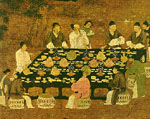Chinese Banquet Etiquette

It is fair to say that the number one pastime in China is eating. Although your Chinese host will not expect you to know everything about proper banquet behavior, he will greatly appreciate it when you are displaying some knowledge of the subject, because it shows that you have respect for Chinese culture, etiquette and traditions.
Banquets are usually held in restaurants in private rooms that have been reserved for the purpose. All members of your delegation should arrive together and on time. You will be met at the door and escorted to the banquet room, where the hosts are likely to have assembled. Traditionally, and as in all situations, the head of your delegation should enter the room first. Do not be surprised if your hosts greet you with a loud round of applause. The proper response is to applaud back.
Seating arrangements, which are based on rank, are stricter than in the West. This is another reason why you should give your host a list of delegation members and their
rank. Guests should never assume that they may sit where they please and should wait for hosts to guide them to their places. Traditionally, the Chinese regard the right side
as the superior and the left side as the inferior. Therefore on formal occasions,
including meetings and banquets, the host invariably arranges for the main guests to sit
on his right side.
It is the host's responsibility to serve the guests, and at very formal banquets people do
not begin to eat until the principal host served a portion to the principal guest. Or, the
host may simply raise his chopsticks and announce that eating has begun. After this
point, one may serve oneself any food in any amount, although it is rude to dig around
in a dish in search of choice portions. Remember to go slow on eating. Don't fill
yourself up when five courses are left to go. To stop eating in the middle of a banquet is
rude, and your host may incorrectly think that something has been done to offend you.
Drinking takes an important place in Chinese banquets. Toasting is mandatory, and the drinking of spirits commences only after the host has made a toast at the beginning of
the meal. It is likely that he will stand and hold his glass out with both hands while
saying a few words. When he says the words gan bei, which
means bottoms up (literally empty glass), all present should drain their glasses. After
this initial toast, drinking and toasting are open to all.
Subsequent toasts
can be made from person to person or to the group as a whole. No words are needed to
make a toast, and it is not necessary to drain your glass, although to do so is more
respectful. Remember that hard liquor should never be drunk alone. If you are thirsty,
you can sip beer or a soft drink individually, but if you prefer to drink hard liquor, be
sure to catch the eye of someone at your table, smile and raise your glass, and drink in
unison. Beer or soft drinks can also be used for toasting.
Also, it is impolite to fill your own glass without first filling glasses of all
others. This applies to all drinks and not just to alcohol. If your glass becomes empty
and your host is observant, it is likely that he will fill it for you immediately. When
filling another's glass, it is polite to fill it as full as you can without having the liquid
spill over the rim. This symbolizes full respect and friendship.
It is a matter of courtesy
for the host to try to get his guests drunk. If you do not intend to drink alcohol, make it
known at the very beginning of the meal to prevent embarrassment. Even then, the host
may good-naturedly try to push you into drinking. One way to eliminate this pressure
is to tell your host that you are allergic to alcohol. In the course of drinking at
banquets, it is not unusual for some Chinese to become quite drunk, although vomiting
or falling down in public entails loss of face. After a few rounds of heavy drinking, you
may notice your hosts excusing themselves to the bathroom, from whence they often
return a bit lighter and reborn for more toasting!
When the last dish is finished, the banquet has officially ended. There is little ceremony
involved with its conclusion. The host may ask if you have eaten your fill, which you
undoubtedly will have done. Then the principal host will rise, signaling that the
banquet has ended. Generally, the principal host will bid good evening to everyone at
the door and stay behind to settle the bill with the restaurateur. Other hosts usually
accompany guests to their vehicles and remain outside waving until the cars have left
the premises.
After you have been entertained by your Chinese associates, it is proper to return the
favor unless time or other constraints make it impossible. A good time to have a return
banquet is on the eve of your departure from China or at the conclusion of the business
at hand.
|